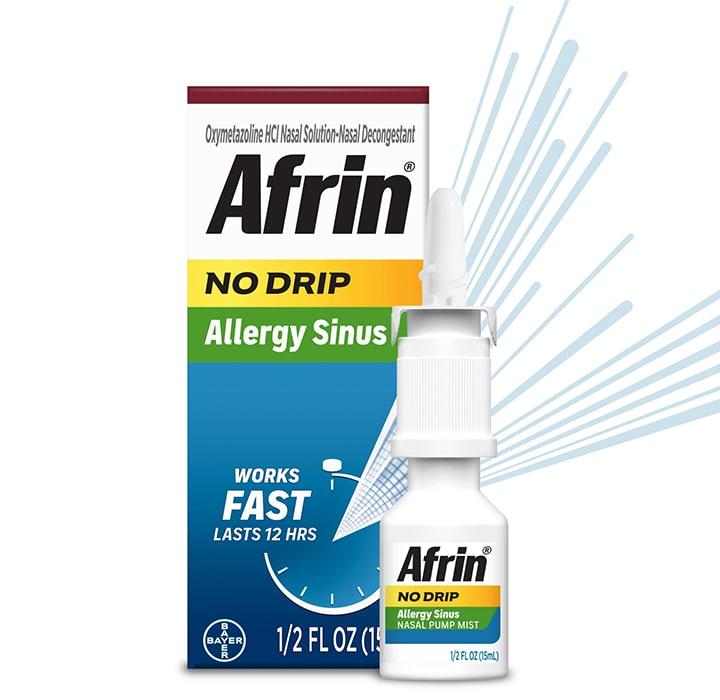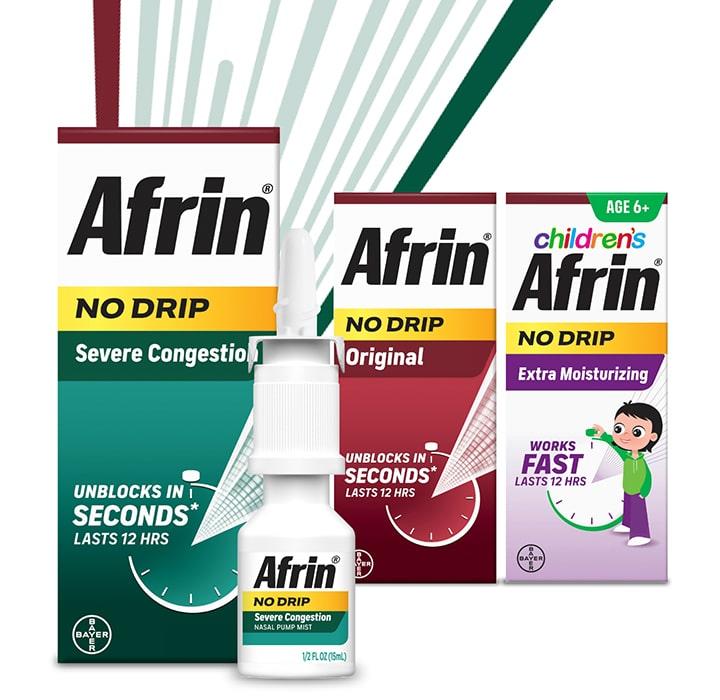IS IT A COLD?
If you’ve got nasal congestion, sore throat, cough, body aches and weakness, chances are it’s not “just allergies".
Colds are viral infections,1 so you'll want to avoid close contact with others, wash your hands often, stay hydrated and rest up. Over the counter topical nasal decongestants can also help. If your symptoms start to worsen or persist, it’s a good idea to talk to your doctor2. After all, an internet search isn’t a diagnosis...
Afrin® No Drip Severe Congestion gives you long-lasting nasal congestion relief with cooling menthol.

IS IT ALLERGIES?
If your symptoms are limited to itchy, watery eyes, sneezing, runny nose or congestion, you may be dealing with allergies.2,3.
An allergy is an exaggerated reaction of your immune system to otherwise harmless substances (allergens such as pet dander, pollen, dust mites, and mold). When you come into contact with these allergens, your body confuses them with harmful substances and attacks them by releasing chemicals such as histamine into the body. These chemicals cause you to experience allergy symptoms like sneezing, itchy and watery eyes, runny nose, or stuffy nose. Allergies are never contagious, but they can run in the family.
You can also explore treatments that can help you feel better from the inside-out.4 An allergist can administer tests and give you personalized advice on what treatments might be available for your allergies.
Afrin® No Drip Allergy Sinus won’t drip down your nose or throat and helps provide fast relief from sinus congestion/ sinus pressure that lasts 12 hours.

COULD IT BE BOTH? NEITHER?
It’s important to keep a running list of all your symptoms so you can work out what’s going on, and how to fix it. All the allergy meds in the world won’t help your sore throat if it’s a cold causing it.
Whether it’s nasal or sinus congestion topical nasal decongestants can help to relieve your congestion by shrinking the swollen nasal membranes and help you breathe more freely.
If you’re not sure about the source of your sniffling, consider a diagnosis from a healthcare professional to rule out other potential causes like bacterial infections, Covid-19 or the flu.
Afrin® No Drip Original gives you fast, powerful relief — whether it’s a cold or allergies causing your nasal congestion.

PREVENTION AND HELPFUL TIPS: COLDS VS. ALLERGIES
READY FOR
SOME HELP?
Whether you have a cold, allergies or both (our condolences), Afrin® can help relieve your nasal congestion when used as directed.
Ready to breathe freely?

References
1. Common Cold. Centers for Disease Control and Prevention. Accessed November 2, 2022.
2. Cold, Flu, or Allergy? Know the Difference for Best Treatment. NIH News in Health. Accessed November 2, 2022.
3. Ragweed Pollen Allergy. Asthma and Allergy Foundation of America. Accessed November 2, 2022.
4. Allergies. Mayo Clinic. Accessed November 2, 2022.
5. COVID-19, cold, allergies and the flu: What are the differences? Mayo Clinic. Accessed November 2, 2022.


